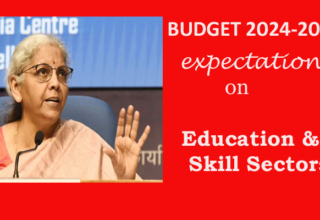
Anand Rathi Advisors Limited (ARAL), one of India’s premier investment consultants, in its latest report on education says the Global Education sector is poised to reach ~$7 trillion by 2027, exhibiting a CAGR of 5%. Similarly, the Global Educational Technology (EdTech) sector is expected to reach ~$500 billion by 2028, with CAGR of 18%.
While unveiling the report, Samir Bahl, CEO – Investment Banking, Anand Rathi Advisors Ltd., said, “The Global Education Industry report is the 6th report in the series of reports released by the Anand Rathi Investment Banking team in this sector and will pave the way for further deliberation on the theme among industry stakeholders.”
The report largely covers a detailed insight of the Education and Edtech markets, examined funding trends, and discussed key education policies for 30 countries across the globe including North America, Europe, BRICS and ASEAN. The professionals have analysed and created brief profiles on more than 2,000 companies in this sector covering various Schools, Universities and Edtech players across the globe.
EdTech market is expected to grow on the back of high young population concentrated in the 05 BRICS regions. By 2025, the BRICS will account for 35% of the global EdTech market. The global population is projected to increase to ~8.5 billion by 2030, up from the current population of ~8 billion in 2023. Over 50% of the rise in global population growth until 2050 is expected to be concentrated in Congo, Egypt, Ethiopia, India, Nigeria, and Pakistan. The largest portion of the increase in smartphone usage will be in China, India, Indonesia, Nigeria, and Pakistan.
The EdTech industry has undergone a trial period and is currently at an inflection point. State and local educational agencies are reinventing themselves around remote learning. Parents are more engaged in their children’s education curricula resulting in a growing appetite for tools that engage and educate their children. Online learning is here to stay in the post-pandemic education system, many students and their families are opting to continue with virtual school when given the chance. According to a survey of 1,000 parents of K–12 students, 45% would opt to keep their children fully online given the chance, and 22% would choose a hybrid model for their children.
Education is an ongoing process. In an era of increasing tech disruption, continuous learning has become ever more important to safeguard jobs for the future. Now with unemployment rates reaching record highs, corporate training and learning new skills is more important than ever – rather than lay offs or furloughs, corporations are instead placing workers into low-cost, high-quality training programs “upskilling” until they gain clarity on the outlook of the business. Companies know that if they are not upskilling their people now, they are going to be caught flatfooted when things go back to normal Acquirer/Investor Checkbooks Remain Open.
Corporates view regular employee reskilling and up-skilling as a necessity. To meet the demand for up-skilling and reskilling, online education companies are expanding and emphasizing their enterprise offerings. Reskilling and 03 upskilling account for 20% of the Global Edtech market in 2022
Key highlights of the research findings –
- Smartphone User Surge: The report anticipates a surge of 200 million new smartphone users in the next two years, reaching a cumulative total of 7.5 billion smartphone users by 2025. China, India, Indonesia, Nigeria, and Pakistan are expected to contribute significantly to this increase.
- Investment Influx: Over the past five years, the Global EdTech sector has witnessed a remarkable influx of investments, totaling $52 billion. This marks a substantial portion of the $84 billion invested in the sector over the last two decades, indicating a growing interest from investors.
- Up-skilling and Re-skilling Boom: With the aging population and muted growth in young demographics in regions like North America and Europe, the Up-skilling and Re-skilling segment is poised for accelerated growth. The demand for skilled resources and the implementation of continuous learning by employers worldwide are significant drivers.
- Foreign Universities in India: Since January 2023, the University Grants Commission has permitted foreign universities to establish campuses in India, opening up new avenues for international collaboration in the education sector.
- Geopolitical Impact: The Russia-Ukraine conflict has significantly affected international students, with approximately 400,000 students studying in these countries. This geopolitical event has reshaped global education dynamics.










